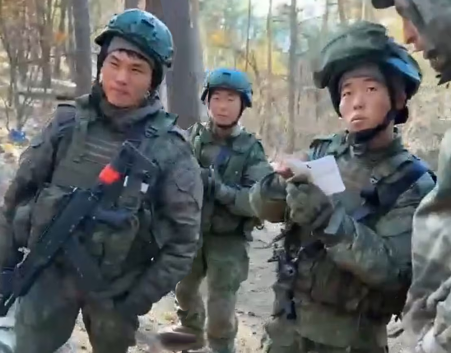Ukraine’s Commander-in-Chief Oleksandr Syrksy vowed to restore the country’s 1991 border. He discussed current battlefield developments and is optimistic about the situation despite it being “difficult.”
JOIN US ON TELEGRAM
Follow our coverage of the war on the @Kyivpost_official.
Despite recent setbacks and Moscow’s military advantages, Ukraine’s Commander-in-Chief Oleksandr Syrksy believes the country will ultimately prevail.
In an interview with the Guardian – his first interview with foreign media since he assumed the role in February – Syrsky addressed recent setbacks and discussed the current battlefield developments, in which he said Russia’s gains – only “tactical” in nature without “operational” breakthroughs – came at a heavy cost.
“Their number of killed is much bigger,” Syrksy said, adding that Russian casualties were “three times” higher than Ukraine’s, and “even more” in some sectors.
Russia’s military strength
Syrsky acknowledged Moscow’s military advantages, both in personnel and resources.
According to him, Russia’s original 100,000-strong invasion force has grown to 520,000, and is aimed to reach 690,000 troops by the end of this year.
“When it comes to equipment, there is a ratio of 1:2 or 1:3 in their favor,” he added, where Russian tank numbers and armored personnel carriers have doubled up from 1,700 to 3,500 and 4,500 to 8,900 respectively, with artillery numbers tripling from the initial days of the invasion.

Which Foreign Leaders Are Invited to Trump’s Inauguration?
Syrsky also said Russia has “superior aviation” and “very strong” air defenses.
Ukraine’s countermeasures
Syrsky, without disclosing Ukraine’s military capabilities in numbers, noted how Ukrainian troops countered Moscow’s far superior numbers.
“For us, the issue of supply, the issue of quality, is really at the forefront,” he said.
He also said Ukraine aimed to conserve resources instead of throwing infantries into the fight to gain “100 or 200 meters,” as commonly seen in Moscow’s tactics.
“It’s very important for us to save the lives of our soldiers. We don’t defend ruins to the death,” he said, adding that he was not willing to “achieve goals at any cost” by “futile meat assaults.”
He said sometimes it was necessary to move to “more favorable positions,” which might explain some of the gains made by Russia in recent months as Ukrainian troops retreat and regroup.
Battling Russia’s air superiority
When it comes to Russia’s air superiority, Syrsky said the new Western F-16 jets can help, but there are nuances.
According to him, F-16s can help Kyiv counter Russian cruise missiles and hit ground targets accurately, though they’d need to fly “40km or more” away from the front line to avoid being shot down. He declined to disclose when the jets would arrive in Ukraine following Kyiv’s Western allies’ statements that they’d arrive “this summer.”
He also said Ukraine has been utilizing unmanned systems – both aerial and ground platforms – to offset Russia’s air superiority, which led to the creation of Ukraine’s Unmanned Systems Forces, a separate military branch and the first of its kind.
“We fight not by quantity but quality,” Syrsky said, adding that drones played “as big a role as artillery.”
On recent battlefield setbacks
As Russia continued to make creeping gains in Ukraine’s eastern territories near Avdiivka, Pokrovsk, and Chasiv Yar, Syrsky tried to put them in context, noting the vast front line in Ukraine and the insignificance of such gains in comparison.
Syrsky said the front line was 3,700 km long, with active fighting taking place across “977 km” of it – “twice the length of the border between Germany and France,” he said.
“In principle, the enemy has not made any significant progress,” Syrsky said.
He also drew attention to how Russian troops have largely faltered in their attempts to advance in Ukraine’s northeastern Kharkiv and Sumy regions bordering Russia, noting that Russia’s plan to create a “so-called security corridor” near the Belgorod region – a notion used by Russian leader Vladimir Putin in May to justify the new offensive – had been thwarted.
On rumors of a new Russian offensive in the southern Zaporizhzhia region, Syrsky said Ukraine would “give them a good response.”
‘Realistic’ plan to retake Crimea
Amidst speculations that the war is turning into a stalemate, Syrsky said Ukraine’s goal continued to be the liberation of all Ukrainian territories to their 1991 borders, the borders Ukraine had following its independence, which includes Crimea.
“We will do everything we can to reach the internationally recognized borders of 1991 [when Ukraine voted for independence from the USSR]. We have to win … to liberate our citizens who are in the occupied territories, who are suffering,” he said.
He also said Ukraine has had success in striking targets in occupied Crimea, forcing Moscow to “completely pull out” from the Crimean port of Sevastopol. He declined to comment on when Ukraine might destroy the Kerch bridge connecting occupied Crimea and mainland Russia, which has been damaged by two Ukrainian attacks thus far and serves as a logistic route for Moscow.
He said Ukraine has a feasible plan to liberate Crimea without disclosing the details.
“It’s realistic. Of course, it’s a big military secret,” said Syrsky.
Syrsky’s predecessor, Valery Zaluzhny, previously said that the liberation of Crimea was one of the initial goals of the 2023 counteroffensive.
Syrsky said that he, like many soldiers, has seen his family rarely, but he believes in Ukraine’s eventual victory.
“They suffer without me, so it’s maybe an issue for me too,” he said. “But I know that we will win. I know how I have to do it. And I’m sure that we will do it.”
You can also highlight the text and press Ctrl + Enter










